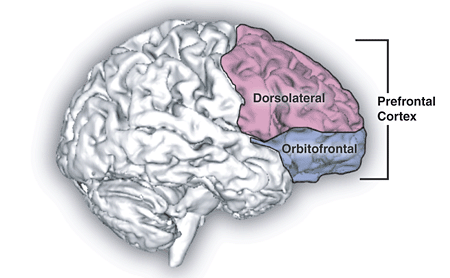This is a very interesting article on the neuroanatomy of altered states of consciousness. He argues that what we think of and experience as altered states of consciousness can be explained by transient prefrontal cortex deregulation.
I think there are serious risks to understanding when we reduce complex subjective experiences to "deregulation" of a particular brain region. Granted, the prefrontal cortex is the seat of executive function (planning, decision making, attention, working memory, self-awareness, and so on), so it makes sense that this region of the brain would be involved in altered states, but I have issues with a reductionist model.
That said, this is still an interesting model his is proposing.
Citation:
Dietrich, A. (2002). Functional neuroanatomy of altered states of consciousness: The transient hypofrontality hypothesis. Consciousness and Cognition, 12 (2003) 231–256. doi:10.1016/S1053-8100(02)00046-6by Arne Dietrich
Department of Psychology, Behavioral Neuroscience Laboratory,
Georgia College and State University, Milledgeville, GA 31061, USAReceived 1 April 2002
Abstract
It is the central hypothesis of this paper that the mental states commonly referred to as altered states of consciousness are principally due to transient prefrontal cortex deregulation. Supportive evidence from psychological and neuroscientific studies of dreaming, endurance running, meditation, daydreaming, hypnosis, and various drug-induced states is presented and integrated. It is proposed that transient hypofrontality is the unifying feature of all altered states and that the phenomenological uniqueness of each state is the result of the differential viability of various frontal circuits. Using an evolutionary approach, consciousness is conceptualized as hierarchically ordered cognitive function. Higher-order structures perform increasingly integrative functions and thus contribute more sophisticated content. Although this implies a holistic approach to consciousness, such a functional hierarchy localizes the most sophisticated layers of consciousness in the zenithal higher-order structure: the prefrontal cortex. The hallmark of altered states of consciousness is the subtle modification of behavioral and cognitive functions that are typically ascribed to the prefrontal cortex. The theoretical framework presented yields a number of testable hypotheses.
Read the whole article.

1 comment:
I find this very interesting. It seems to confirm a hypothesis proposed by the danish author, thinker and scholar of religion Erwin Netuzsky-Wulff, in his book "Det Overnaturlige" (The Supernatural)from 2004. In it he makes the claim that altered states - or "transcendence" - are induced by a temporary inhibition of the prefrontal cortex.
Post a Comment